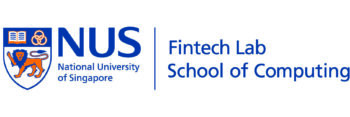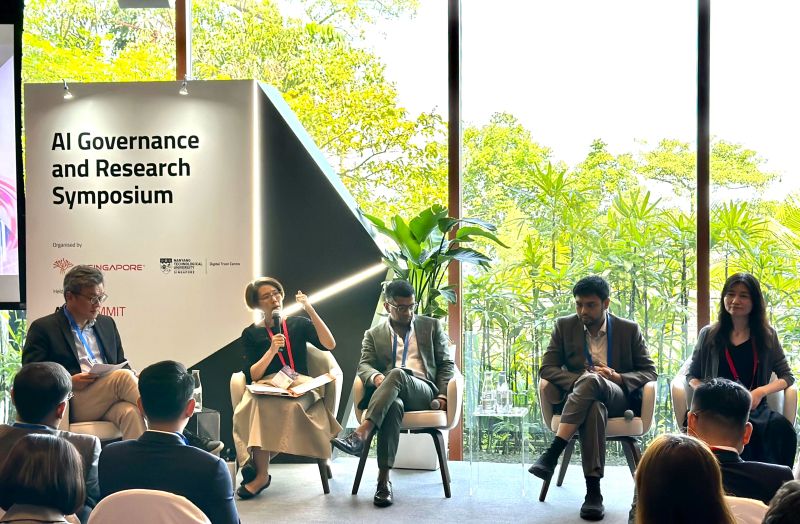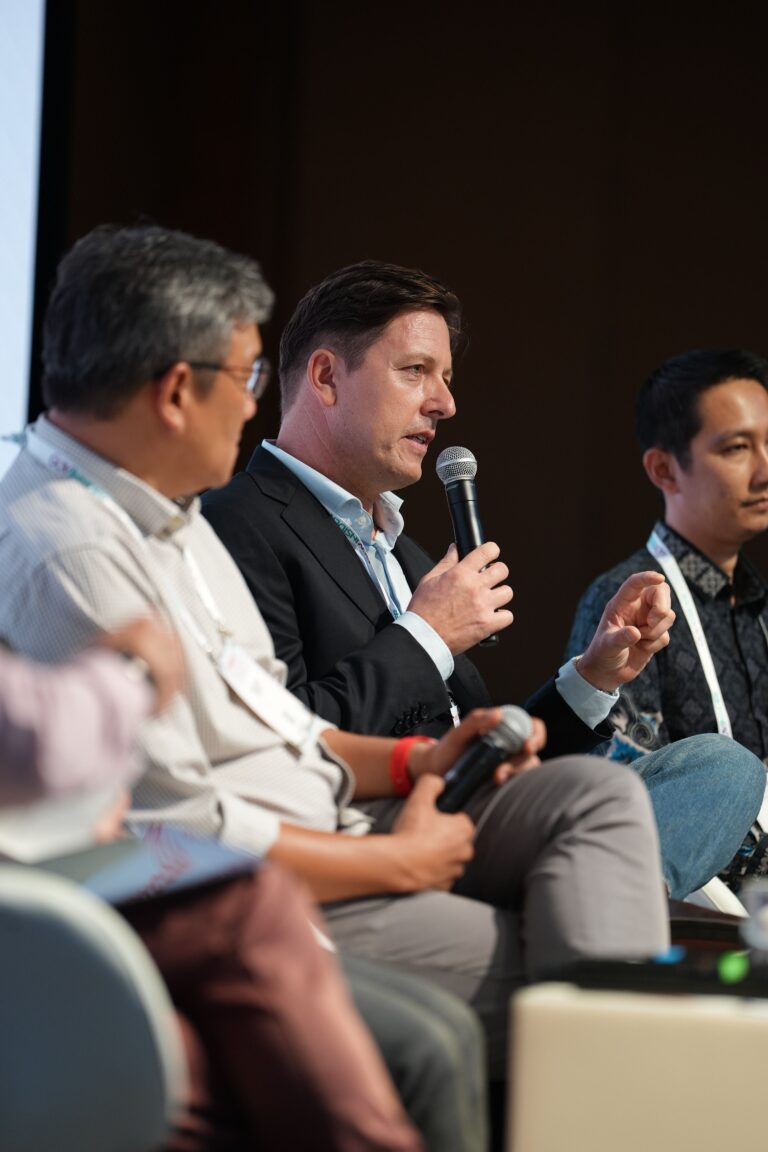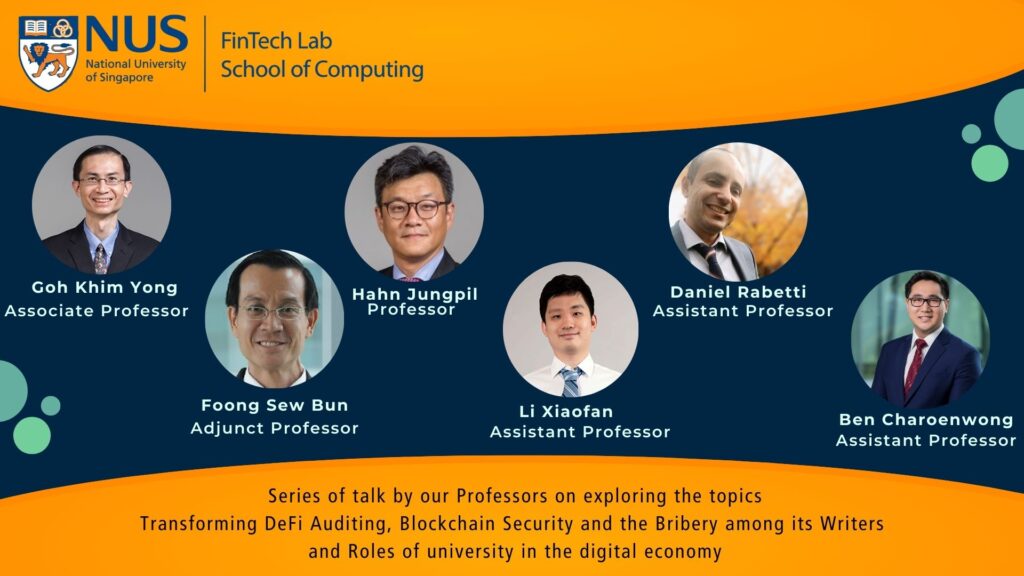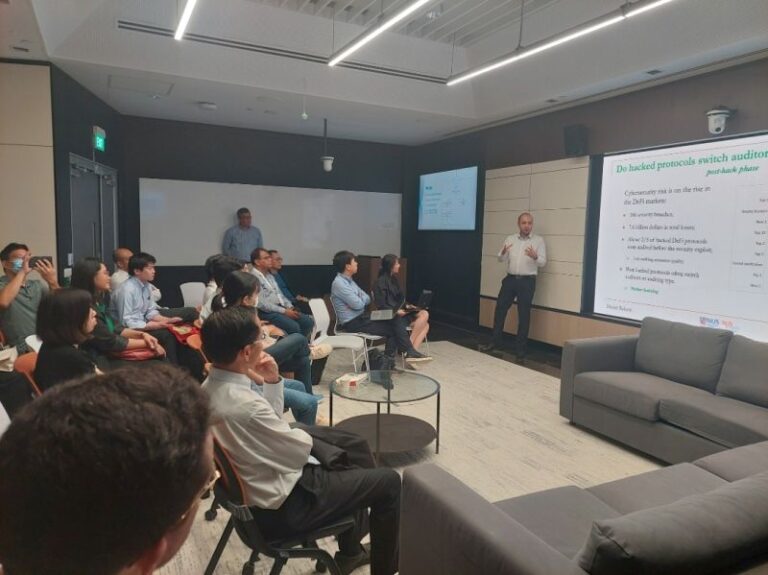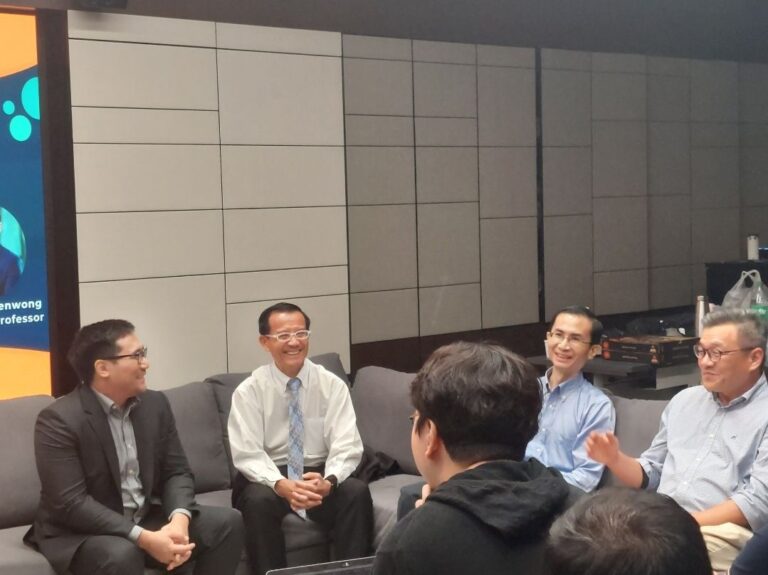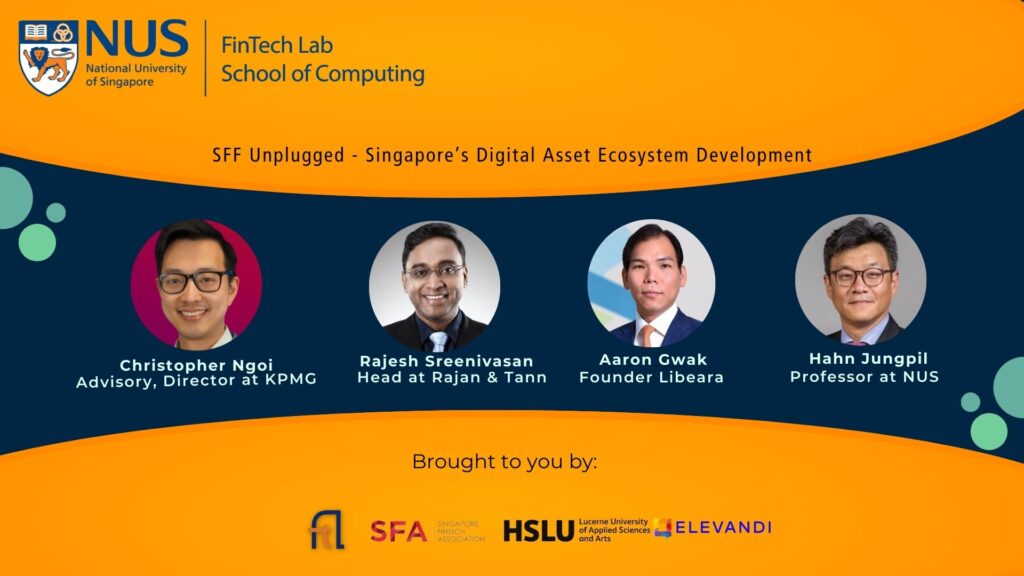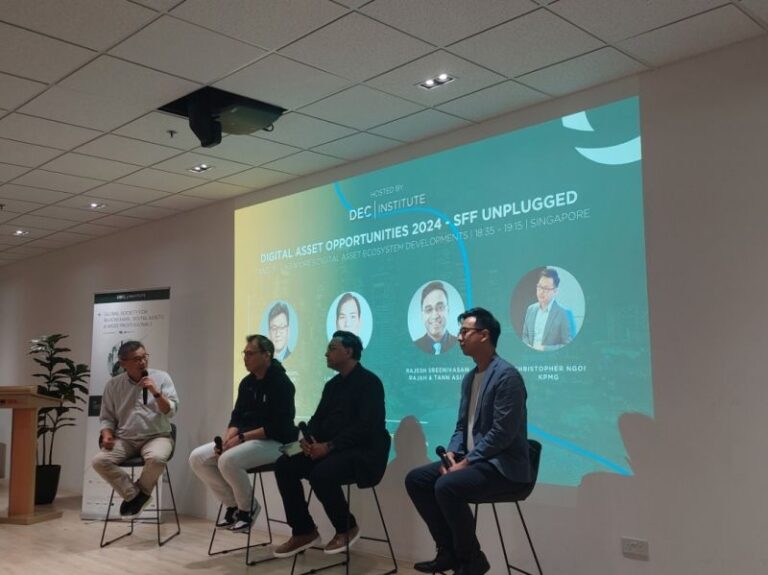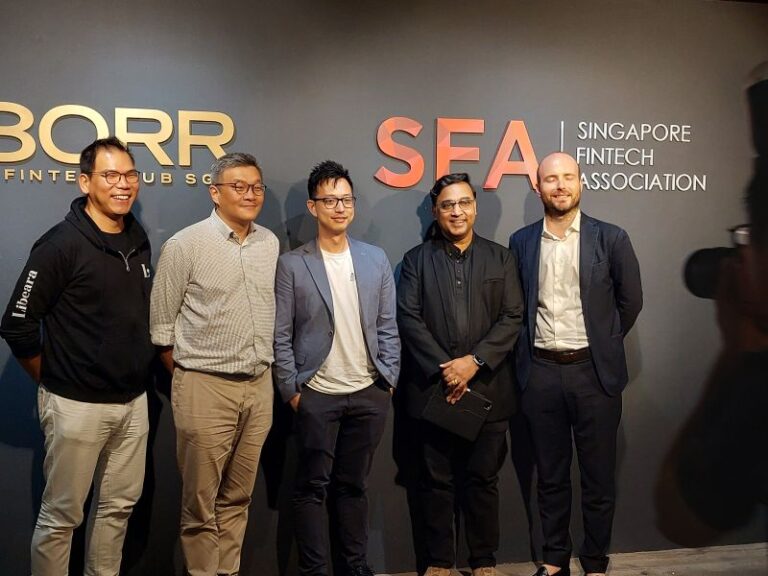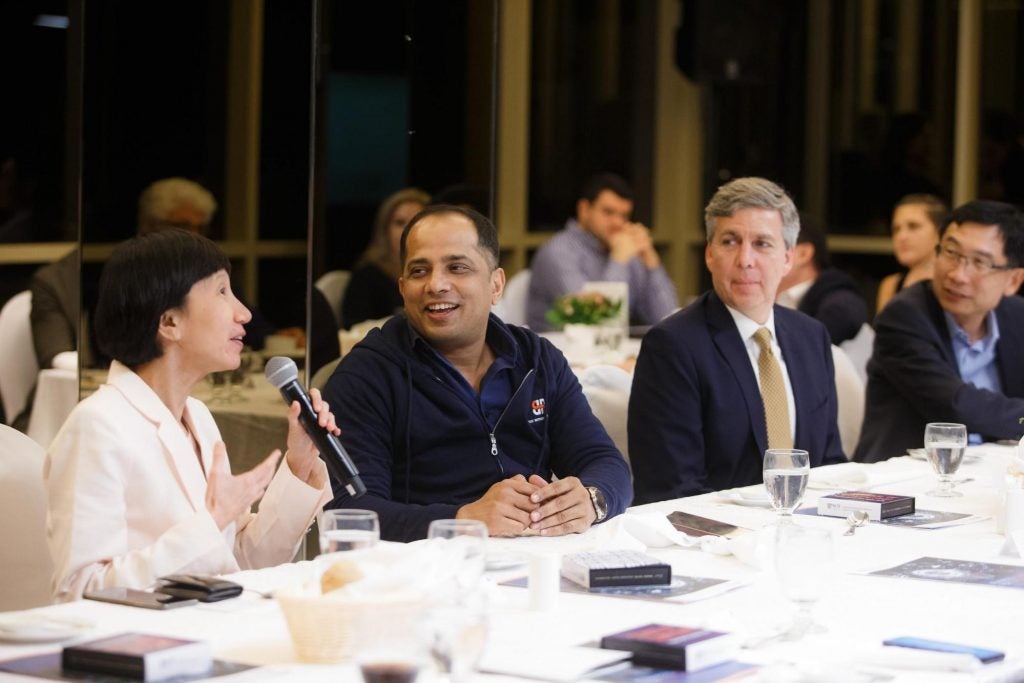On a balmy evening in early November, the NUS School of Computing (SoC) played host to a gathering of distinguished academics and leading figures in business, including Neo Kian Hong, Singapore Mass Rapid Transit (SMRT) CEO, Sreeram Iyer, ANZ Bank COO, Janet Young, Head Group Channels United Overseas Bank(UOB), Navin Gupta, MD Ripple, Chuah Kee Heng, CEO Singapore Power (SP) Services, Tan Peng Yam, CEO Singapore Gov, Defense Science and Technology Agency, Eric Van Miltenburg, SVP Global Operation, Ripple, Sopnendu Mohanty Chief Fintech Officer Monetary Authority of Singapore, Honorable Kotaro Tamura, Past Member of the Diet, advisor Prime Minister of Japan, Bruce Liang, CEO IHiS (Integrated Health Information Systems) Singapore. This Leadership Dialogue Dinner was a chance for industry leaders and academic experts to have an in-depth discussion about the emerging FinTech sector in Singapore as well as to introduce the newly launched NUS Ripple FinTech Lab to those gathered there. Having crossed the S$1 billion mark in investments by September 2019, the local FinTech industry has been going from strength to strength, and this event served as a timely forum about the role key industry, academic and government players have in driving the growth of FinTech further in 2020.
Professor Mohan Kankanhalli, Dean of SoC, kicked off the discussion of the night with an increasingly pressing technological concern in our modern times — data privacy and security online. In the face of mounting mistrust in big technology companies, it is key to recognise that anonymisation of data is an integral part of any business with a digital aspect, and that keeping data safe and secure at all times cannot be the work of an afterthought. Current methods of anonymisation are falling short of the mark: it only takes four random transactions to re-identify 90% of shoppers as individuals from their credit card metadata, and the identifiability of individuals increases with each new attribute in a given data set.
Cutting edge FinTech applications have already improved the efficiency and convenience of shopping, banking, and communication, and the sector is already working to build better protections around the user data that is generated every time a person uses their mobile phone or laptop. Whether they choose to employ ring signatures and privacy-preserving technologies, or zero-knowledge proofs and blockchain, major companies and businesses have an imperative to lead the way in developing better protection of the personal and financial data that customers generate in their day-to-day dealings. In his remarks, Professor Kankanhalli also explained how the NUS N-CRiPT Centre is at the forefront of developing novel privacy-preserving techniques with their research into issues such as biometrics, smart grids, and Internet-of-Things devices.
Over the course of the night, the discussion turned to the issue of expertise and whether leading businesses and their boards of directors were prepared to meet the challenges of rapidly evolving technology. It is part of the remit of a board to think ahead of the times, make confirm strategic objectives, and oversee activities related to compliance. As technology continues to advance in capabilities and regulation evolves alongside it, boards will need to include one or more members who have insight into the technical nature of emerging technology, while understanding how they fit into the wider landscape of the industry. These expert members will be able to act as a neutral party for the board, helping to separate fact from marketing hype when incorporating the new capabilities of Industry 4.0 whilst steering the course of their business strategy. “A technology person on the board would be squeezed for all the information they know!”.
As part of the ongoing dialogue of the event, attendees agreed that senior leaders of business and academia should be taking a greater role when it comes to regulating technology while allowing space for innovation to flourish. The Monetary Authority of Singapore (MAS) has been proactive about building a flexible and inclusive regulatory framework for digital payments and banking services, as seen in the Payment Services Act and the new licenses being given out for digital banks. Leaders of the industry should be just as responsive, taking the opportunity to come together and act as an impartial party in guiding how developing technology can be safely regulated without impeding boundary-breaking progress. Regulators throughout the Asia Pacific often look to Singapore to set the benchmark for regulating technology, so it is in the interest of our government, businesses, and researchers to ensure technological developments can continue to grow in a regulated environment in the nation and throughout the region.
On the whole, the main message of the night emphasised a culture of collaboration across industries and between public and private institutions and the importance of a FinTech eco-system. No industry can thrive in isolation, and the ones that reach out to new partners early will have the upper hand. A global survey by PwC found that 47% of technology, media and telecommunications and 48% of financial services organisations have integrated FinTech fully into their strategic operating models, while many are looking to cross-sector fusion to sharpen operational efficiency, reduce costs, and better the customer experience. The market in Singapore is rich in potential collaborators whether they be big tech innovators or budding startups, and the NUS Ripple FinTech Lab has recently been launched in the hopes of facilitating and growing such partnerships between finance and business institutions, government agencies, and academic experts.
Established through a partnership between NUS and Ripple’s University Blockchain Research Initiative (UBRI), the lab will serve as a hub for cooperation and collaboration between major stakeholders, a neutral space where the intersecting business, regulatory, and educational interests in the homegrown FinTech sector can be openly discussed for the benefit of all. The NUS FinTech lab will form the education arm of NUS Computing’s Industry FinTech Initiatives (SIFI), and will provide experiential education to enable people to experience traditional financial technology and the use the new tech to make the buzz words understandable, increase interest in the jobs and research problems in the industry and generally make the whole industry more accessible and approachable for all. With ambitious plans to introduce FinTech to 1,000 students and industry professionals by the end of 2020, the lab will be offering a variety of courses and programmes open to all NUS faculty and students as well as the wider community of entrepreneurs and industry professionals.
While dinner and discussion ended with the night at SoC’s Leadership Dialogue Dinner, the true dialogue that will shape FinTech’s future is ongoing, and it is in the hands of business leaders, lawmakers and academics to use strong partnerships and smart oversight to propel this burgeoning field faster and further in 2020.
